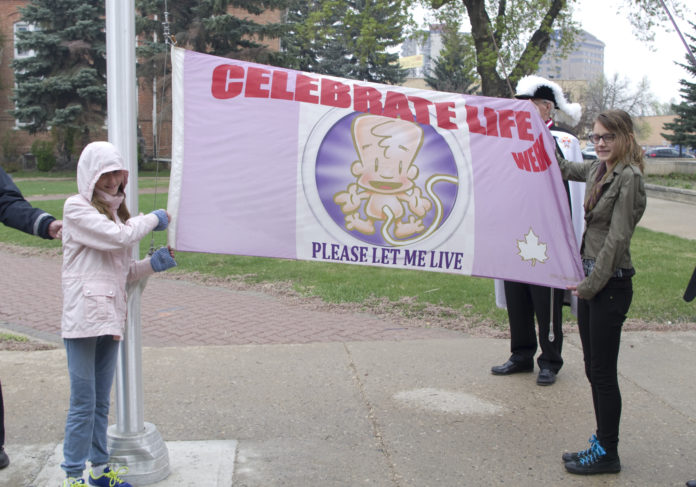CORRECTION: A previous version of this article contained an inaccurately transcribed quote. JCCF lawyer Marty Moore is incorrectly quoted as saying “the court should find that freedom of expression has been provided in this case without justification.” The correct quote is “the court should find that freedom of expression has been violated in this case without justification.” The Daily Herald apologizes for the error.
Lawyers for a local pro-life advocacy group have argued that the City of Prince Albert gave insufficient reasons for refusing to fly a Celebrate Life Week flag back in May.
Attorneys from Prince Albert Right to Life and the City of Prince Albert gave their arguments as the case over the city’s decision to stop flying the flag at the Memorial Square courtesy flagpole were heard on Tuesday.
Justice Centre for Constitutional Freedoms (JCCF) lawyer Marty Moore made arguments on behalf of PA Right to Life. Moore argued that there is no doubt the city has the right to restrict certain flags from flying. However, he argued there is doubt as to whether city bylaws were properly applied.
“We believe that the city needs to follow the rule of law when making decisions that affect charter freedoms,” Moore said during a media scrum on the steps of the Court of Queens Bench. “Part of the rule of law is that it provide reasons that are intelligible, transparent and can be reviewed by a court. In this case there were insufficient reasons provided, and the court should find that freedom of expression has been violated in this case without justification.”
Moore’s main argument hinges on a text message sent by Prince Albert Mayor Greg Dionne to a PA Right to Life member. After calling to notify the group that a there flag would not be flown because it was not a “national” flag, and as such violated the city’s courtesy flagpole policy, the Right to Life member sent a text asking for clarification about what constituted a national flag.
According to documents filed by Moore, Dionne texted back saying the flag should be flown in cities around Canada. When the member asked if this was in city bylaws, Dionne sent a text back saying this was his office trying to work through the issue and find a solution.
Moore argued that PA Right to Life heard nothing further from the Mayor until stories about the decision started appearing in local media. He said quotes attributed to Dionne showed the city was uncomfortable with the content on the flag, and not whether it was a national or local design.
Moore called the city’s handling of the flag application “irresponsible,” and argued that PA Right to Life did not receive any further instruction about their application, or further reasons for why their flag needed to be a national flag.
Moore also pointed out that the Celebrate Life Week flag had flown every year since 2007, and called the design, which features a cartoon fetus named Umberto, an “entirely positive and friendly” message.
“Citizens deserve respect from the government, and when the government makes decisions infringing on the fundamental charter rights and freedoms, all citizens deserve transparent reasons to determine the basis on which those infringements are made,” Moore said. “The court then should be able to review that.”
Acting city solicitor Mitch Holash made arguments on behalf of the City of Prince Albert. Holash argued it was unfair and inaccurate to put the blame on Dionne, since he was acting based on direction from city council and from the Director of Community Services, who is responsible for enforcing the flag policy.
Holash said it’s incorrect to argue the Mayor is “the boss” of the Community Services Department, since he is oversees the city solicitor, city manager and city clerk. The Director of Community Services reports to the city manager.
“The mayor was alerted to that controversy in council chambers and council asked him to try to work out a solution and that solution wasn’t reached, so the flag didn’t fly” Holash said afterwards. “Interestingly, the flag was never submitted, it would appear, to the city and that is a requirement before there’s any entitlement to fly the flag.”
Holash argued that the city had never formally denied that PA Right to Life could fly a flag since the group never provided an alternative design for consideration. He said the burden of continuing the talks fell to them, and not to the city, who had no choice but to not fly the flag once the lines of communication closed. Because they had never been formally denied, Holash argued the court had no jurisdiction to rule on the case. He also argued that any quotes from Dionne that appeared in media reports were not reliable and should be considered hearsay. Moore countered that Holash’s argument about formal denial amounted to a “distinction without a difference.”
Holash also stressed that the city had no official position on abortion, but had a duty to not fly flags that were controversial or offensive. He said members of city council had received enough negative correspondence about the flag to indicate that it was too controversial to fly.
“In this case there were expressions of controversy with respect to the flag,” he said. “While the mayor was charged by city council to try to find a way to resolve that particular issue to allow some type of flag to fly in support of this particular cause, that resolution wasn’t achievable. The city feels that it made reasonable efforts to accommodate this group, as it does all groups.”
The presiding judge reserved ruling on the case until a later date. There is no set timetable for when a decision will come down.


